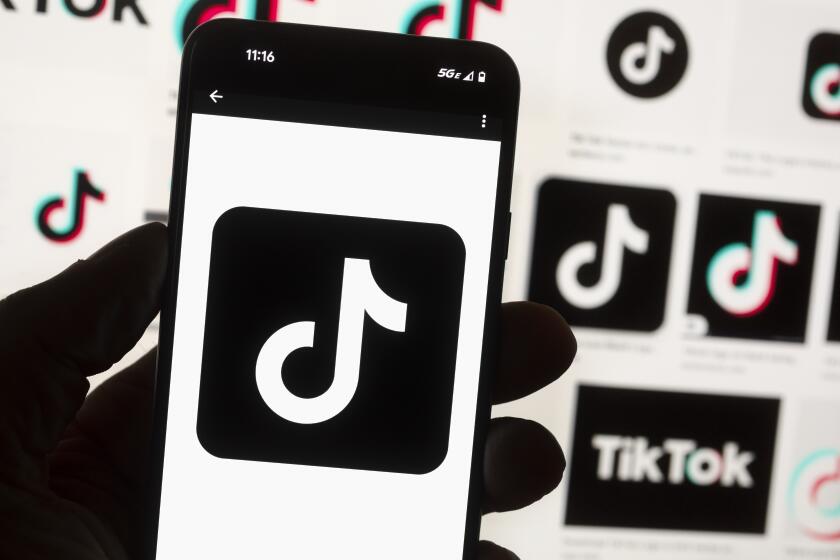U.S. demands that TikTok’s Chinese owners sell stakes or face ban

- Share via
The U.S. has told the Chinese owners of the video-sharing app TikTok that they must sell their shares or risk the app being banned in the U.S., people familiar with the matter said.
The Treasury Department is leading the discussion through the Committee on Foreign Investment in the U.S., or CFIUS, and made the demand recently to Tiktok’s Chinese owner, ByteDance Ltd., the people said. They asked not to be identified discussing private deliberations.
TikTok’s leadership has been discussing the possibility of separating from ByteDance to help address concerns about national security risks, Bloomberg News reported Tuesday. One person said TikTok’s owners could retain some form of ownership but through a passive structure.
“If protecting national security is the objective, divestment doesn’t solve the problem: a change in ownership would not impose any new restrictions on data flows or access,” TikTok spokeswoman Maureen Shanahan said in a statement. “The best way to address concerns about national security is with the transparent, U.S.-based protection of U.S. user data and systems, with robust third-party monitoring, vetting and verification, which we are already implementing.”
The company, which is undergoing a national security review by CFIUS, agreed last year to implement a number of changes in a plan it calls Project Texas. The proposal includes bringing in American technology giant Oracle Corp. to host U.S. user data and review its software, and appointing a three-person government-approved oversight board. Many of the moves are already underway.
The CFIUS demand doesn’t end that review but offers a potential way forward after the administration had said it was unpersuaded that an agreement under discussion didn’t go far enough to address security concerns.
Citing online security concerns, the O.C. Board of Supervisors declared that county employees can no longer use TikTok on government phones and computers.
It’s unclear how Beijing would respond to a forced sale by TikTok’s owner, the world’s largest startup with a valuation of $220 billion and considered one of China’s highest-profile companies abroad. But the government has indicated it would scrutinize such a deal carefully, for fear of data or algorithms ending up in foreign hands.
TikTok itself could be valued at $40 billion to $50 billion based on social media multiples and other factors, according to Bloomberg Intelligence analysts Mandeep Singh and Damian Reimertz.
The administration was unconvinced by TikTok’s proposal to add layers of oversight and separation from ByteDance, according to another person familiar with the matter. TikTok has poured $1.5 billion into Project Texas, but the details have been met with skepticism on Capitol Hill as well.
The move marks a major escalation by the administration in the U.S. relationship with China at a time when the two countries are already clashing over issues such as the fate of Taiwan, export controls of microchips and China’s strengthening partnership with Russia.
The U.S. National Security Council and the departments of Treasury and Justice didn’t immediately respond to requests for comment. The Wall Street Journal reported the Biden administration’s demand earlier Wednesday.
U.S. officials have been airing long-standing national security concerns about TikTok. FBI Director Christopher A. Wray told lawmakers in November that China’s government could use the app to control millions of users’ data or software, and its recommendation algorithm — which determines which videos users will see next — “could be used for influence operations if they so choose.”
TikTok says every account held by a user under the age of 18 will have a default 60-minute daily screen time limit amid fears of overuse by minors.
“Under Chinese law, Chinese companies are required to essentially — and I’m going to shorthand here — basically do whatever the Chinese government wants them to do in terms of sharing information or serving as a tool of the Chinese government,” Wray told the House Homeland Security Committee. “That’s plenty of reason by itself to be extremely concerned.”
TikTok Chief Executive Shou Zi Chew has been asked to testify before a House committee next week about the app’s data privacy and security practices, and the company’s relationship with the Chinese Communist Party.
A divestiture, which could result in a sale or initial public offering, is considered a last resort, to be pursued only if the company’s existing proposal with national security officials doesn’t get approved, according to people familiar with the matter, who asked not to be identified discussing non-public information.
Bloomberg writers Alex Barinka and Daniel Flatley contributed to this report.








